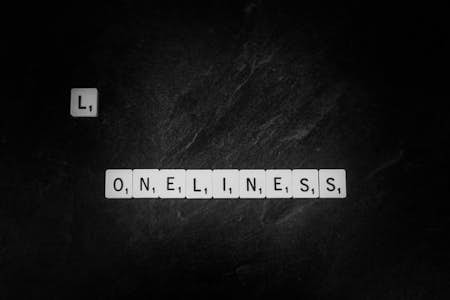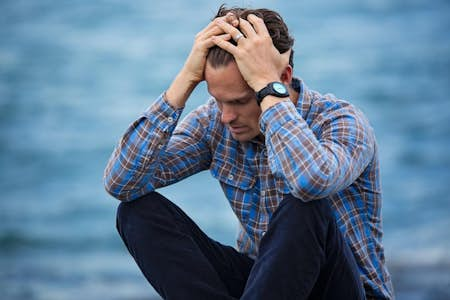It can be hard to talk about loneliness. Even though millions of people across the UK report feeling lonely, there's still a social stigma attached to "being alone". But being alone isn't the same as feeling lonely. Many people enjoy being in their own company, and solitude can be good for you. As a result, you might not know the signs of being lonely.
1. Feeling disconnected from other people
The most obvious sign of loneliness is a lack of physical contact with people. However, loneliness and social isolation are not the same things. While one person might enjoy spending most of their time on their own, another person would find this isolating.
The charity Mind defines loneliness as “the feeling we get when our need for rewarding social contact and relationships is not met”. So, even if you have interactions with people but don’t feel rewarded by them, you may experience loneliness. Perhaps, you would prefer a close-knit social group or a deeper relationship with family members or neighbours.
Online relationships and higher use of social media have been found to be linked to insomnia and increased loneliness, particularly in women.
2. Going through a significant life event
According to the NHS website, significant life events can trigger feelings of loneliness. Life transitions are complicated, and positive and negative experiences can lead us to feel lonely. This might be starting university, moving house, having a baby, or planning a big event. Regardless of the perceived impact of these milestones, changes that have us grappling with new circumstances are one of the common causes of loneliness.
We might also feel lonely in a new situation when we compare ourselves negatively with others. For example, a 2017 study on new mums found that “reflecting loneliness” arose when they felt they weren’t doing as well as they should be.
Young people who move away to university may also struggle with loneliness. Adjusting to a changing social identity, managing studies, and new responsibilities can compound to leave young people feeling overwhelmed. Loneliness can cause some students to question their social connections and engage in risky behaviour.
3. Worsening mental health
As the charity Mind says, ”feeling lonely isn't in itself a mental health problem”. But loneliness can worsen mental health concerns such as depression and anxiety (APA).
The Red Cross is working to combat loneliness in Britain. According to their Covid-19 loneliness report released in 2020, two in five people say that loneliness negatively impacts their mental health. The report also includes small case studies demonstrating how loneliness affects people's mental wellbeing. For example, one anonymous Liverpool resident said:
“I want to get out, and then when I’m out I feel anxious. It makes me feel lonelier because I can see people out with other people enjoying themselves.”
If you think loneliness is affecting your mental health, the NHS website can help. Their dedicated loneliness page has an abundance of resources, including a mood test to help you identify what’s going on, self-help guides, and contact details of organisations that can help you.
Feelings of loneliness are often associated with depressive symptoms. People suffering from depression and other mental illnesses are also more inclined to feel lonely. A study published in The Lancet found that we could prevent 11 - 18% of depression cases in older people by eradicating loneliness.
4. Noticing physical health problems
Research on participants aged between 60 and 106 found that "feelings of loneliness decrease one's evaluation of physical wellbeing". Likewise, a different study examined links between the common cold and loneliness. Researchers found that the perception of loneliness is more closely linked to self-reported illness symptoms than social isolation on its own.
This could be because lonely people are more likely to notice symptoms. Or, it could be that loneliness leads to negative thinking; when you’re feeling low, it’s easy to get weighed down with negative thoughts. Chronic loneliness also increases other physical health risks like high blood pressure, obesity and a weakened immune system.
5. Feeling sleep-deprived
Analysis shows that loneliness and sleep disturbances are related. Interestingly, it's not how long but how well you sleep that affects loneliness. However, it's not clear whether sleep deprivation causes loneliness or loneliness causes sleep deprivation. You might wake up from a poor night's sleep feeling lonely, but which problem should you address?
Poor quality or simply not enough sleep can cause health issues too. For example, a weakened immune system, weight gain and high blood pressure are health conditions associated with a lack of quality sleep. Then there is the mental and emotional side, too - it's harder to concentrate and manage our emotions when we're sleep-deprived.
According to a 2018 study, lack of sleep can affect more than just the sleep-deprived person. Sleep deprivation can affect the way we interact and even make others want to communicate with us less. For example, researchers found that people who come in contact with someone who is sleep-deprived, even through a brief one-minute interaction, subsequently feel lonelier themselves.
6. Not wanting to talk about loneliness
Avoiding facing loneliness head-on doesn't make it go away. If you're not comfortable talking about feeling lonely, it doesn't mean it's not there. A British Red Cross report found a significant discomfort over talking about the loneliness of friends and family during Covid-19. This was even though most people agreed that everyone had been negatively affected by lockdown measures!
Avoiding speaking about loneliness can help those feelings to grow. However, this can lead to low self-esteem and even create distance between ourselves and a loved one.
Let’s Talk About Loneliness is a public health campaign supported by the UK government and many big-name charities and organisations. As part of their campaign, they invite people to use the hashtag #LetsTalkLoneliness to start conversations about loneliness. Their loneliness toolkit also provides practical support and advice to people who need a hand.
What should you do if you feel lonely?
First of all, don’t panic. You’re not the only one who feels this way. Loneliness is more common than you might think, but many people don't know where to get help. For example, the British Red Cross reports a low awareness of non-face-to-face support options for addressing loneliness.
Mick Cooper, Professor of Counselling Psychology at the University of Roehampton, told Health Times: "Research shows that most of us have a deep need for connection with others: it can make us happier, give us a sense of meaning, and help us feel more secure in our lives. There’s no shame in feeling lonely: it’s a sign that we’re human beings like everyone else. What’s important is to be able to recognise it and find ways to reach out to others so we can overcome it."
Access social support for loneliness
Charities such as Age UK offer a wide range of support and activities for older people facing loneliness. They offer activities including volunteer-led chats, social activities, day centres, and lunch clubs. The charity can also help you improve your technology skills so you can make video calls and keep in touch with people online.
Calling a helpline like the Samaritans is another way people can discuss feeling lonely without worrying about how others may perceive them. Reaching out to support services when experiencing chronic loneliness is the first step to overcoming it. If speaking with family or friends in your social network about loneliness is difficult, try accessing other services for support.
If you recognise signs of loneliness, it's best to talk to someone about it. If you're interested in finding out more about resources and statistics on loneliness, look at our latest articles.
Speak with your healthcare provider
It’s also a good idea to talk to your GP about how you’re feeling. Health professionals can support you in various ways. For example, they may arrange for you to speak to a counsellor or join a local activity that can help.
In recent years, NHS England also launched social prescribing. The idea is to enable GPs, nurses, and other healthcare professionals to refer people to local, non-clinical services like community groups, activities, or emotional support networks. The government plans to build on this initiative and says medical professionals will refer 9,000 people to social prescribing by 2023/24.
Get active
Physical activity, particularly group exercise classes, alleviates loneliness and feelings of social isolation. Spending time exercising with a group delivers the usual health benefits, reduces social anxiety, and improves mental health. Exercise has the added benefits of lowering cortisol and increasing your feel-good body chemistry, too.









